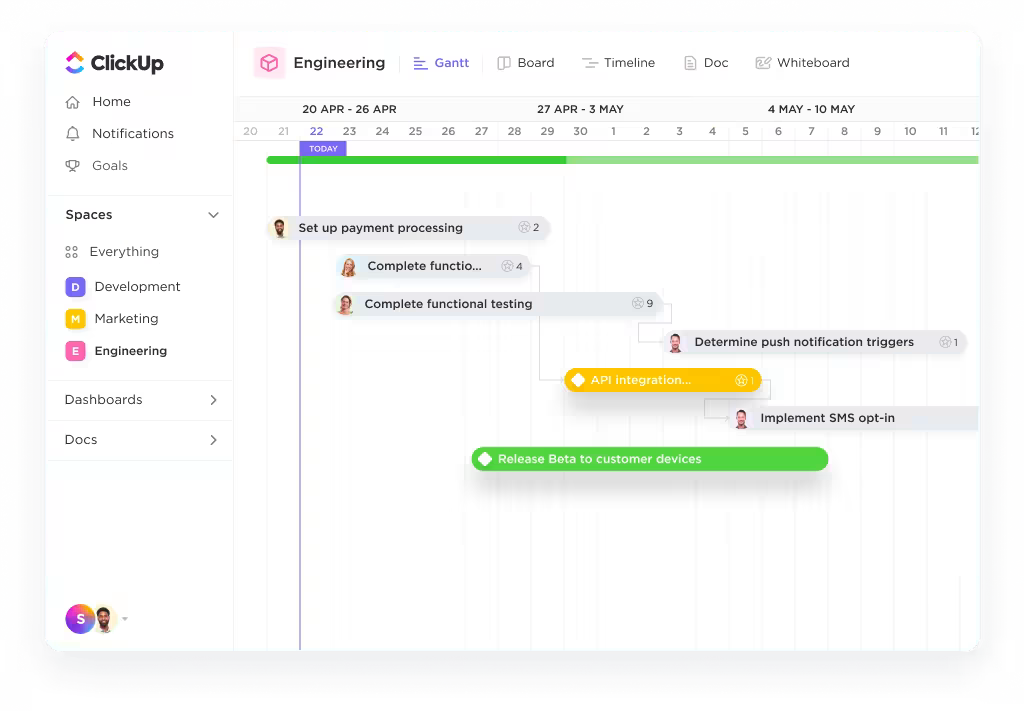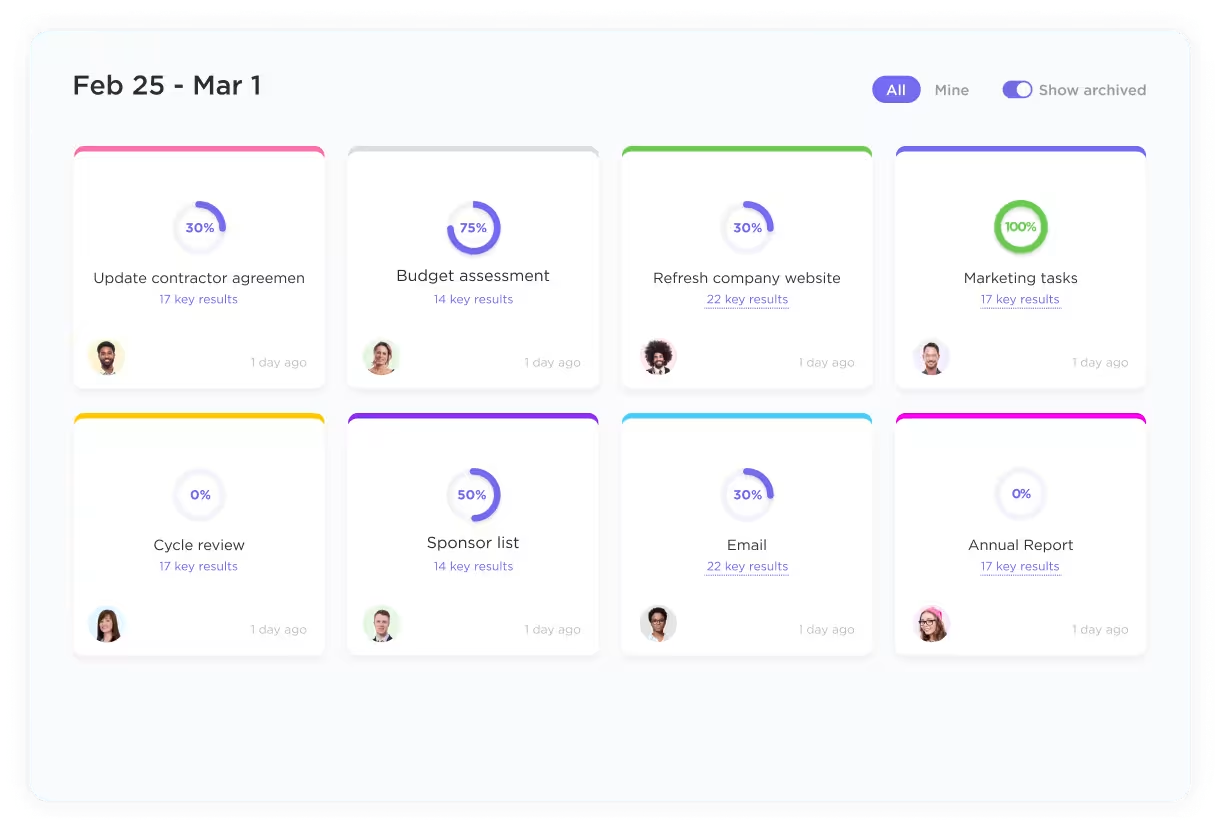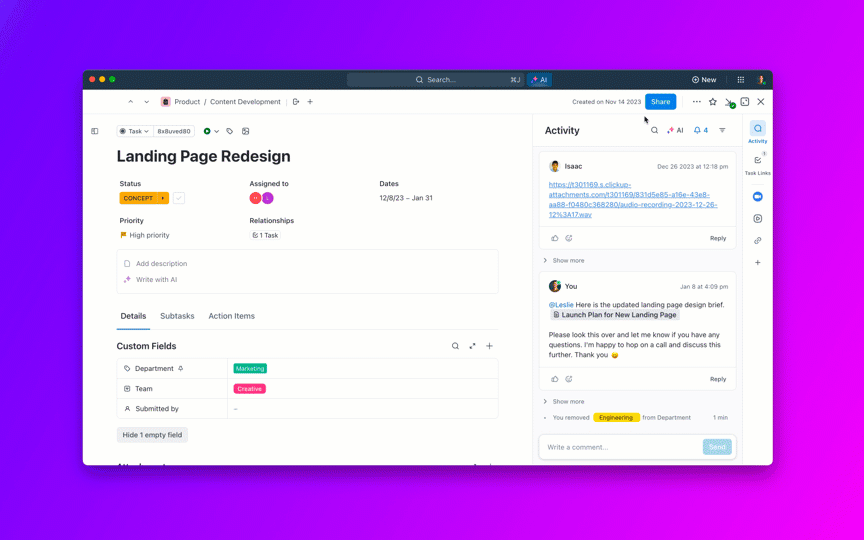Project Management Career Path: Education, Jobs, and Salaries

Sorry, there were no results found for “”
Sorry, there were no results found for “”
Sorry, there were no results found for “”

The project management career path isn’t for the faint-hearted. When that almighty deadline hits, project managers must remain calm and collected and keep driving progress. 🥷
The industry understands the value of this role, too! According to the Project Management Institute’s Talent Gap Report, the global economy will need a staggering 25 million new project professionals by 2030.
That’s a huge surge in demand spanning virtually every industry! As businesses tackle increasingly complex challenges, they desperately need skilled project managers who can navigate uncertainty, boost efficiency, and deliver results.
Ready to explore this exciting field? This guide will walk you through everything you need to know about the project manager career path—from entry-level positions to executive roles, must-have skills, education options, salary expectations, and practical strategies to fast-track your career in this thriving profession.
Wondering if project management is right for you? Here’s the scoop: it’s one of the most versatile and rewarding career paths you can find today.
Even during economic downturns, this profession offers remarkable job security, with growth consistently outpacing other occupations. The Bureau of Labor Statistics backs this up, projecting that project management-related jobs will grow 7% faster than average through 2031.
And let’s talk about the money—because, yes, it matters! Mid-career project managers typically earn between $85,000-$120,000 annually, with senior and specialized roles commanding well over $150,000.
But perhaps the coolest thing about this career path? The skills you’ll develop can be applied across virtually any industry that interests you. Yep, career change is welcomed and often works in your favor when it comes to project management.
Which industries rely heavily on project managers? Here are some major players:
☕️ Meet The PM: Want to hear from ClickUp’s PMs? Here we go. 👇🏼

The beauty of project management is that it offers a structured yet flexible career progression with multiple paths depending on your interests and strengths.
Let’s break down the key roles you might explore as you climb the project management ladder.
Think of project coordinators as the operational backbone of project teams. They’re the ones supporting project managers with scheduling, documentation, meeting coordination, and basic stakeholder communications. It’s the perfect starting point if you’re looking to develop foundational skills while watching experienced pros navigate complex challenges.
✅ Rock-solid organizational abilities
✅ Eagle-eye attention to detail
✅ Basic understanding of project management methodologies
✅ Comfort with project management software
✅ Clear and effective communication skills
💸 Money matters: Entry-level project coordinators typically earn between $45,000 and $65,000, depending on industry and location. The good news is that this role offers excellent growth potential. Many coordinators advance to project manager positions within 2-3 years, especially when they pursue certifications alongside their day jobs.
This project management role takes you right to the middle of the battle field! As a project manager, you’ll take full responsibility for planning, executing, and closing projects within defined scope, time, and budget constraints. You’ll need to balance technical knowledge with leadership skills as you guide diverse teams toward successful outcomes while managing stakeholder expectations.
✅ Leadership and team management
✅ Risk assessment and mitigation strategies
✅ Budget development and financial tracking
✅ Stakeholder management and communication
✅ Problem-solving and decision-making under pressure
✅ Proficiency with project methodologies (Agile, Waterfall, etc.)
💸 Money matters: Salary-wise, mid-level project managers earn between $75,000-$110,000 on average, with variations based on industry, certifications, and location. After 3-5 years of successfully delivering projects, many advance to senior positions or specialize in program management.
☕️ Meet the PM: Exactly just how interesting is a project management career? Hear it from Marthe Kristine Sand, Project Manager for Reach Remote Project.
Ready for more responsibility? Senior project managers and program managers expand their focus beyond individual projects to manage interconnected initiatives that advance strategic business objectives.
Program managers coordinate multiple related projects, balancing resources across projects while ensuring alignment with organizational goals. This is what it’s like to be a program manager at Google, for instance. 👇🏼
✅ Strategic planning and business alignment
✅ Advanced stakeholder management and executive communication
✅ Resource optimization across multiple projects
✅ Benefits realization and organizational change management
✅ Portfolio prioritization and project selection
💸 Money matters: These professionals typically earn between $100,000-$140,000, with some specialized industries like pharmaceuticals or management consulting offering even higher compensation. Many advance to director-level positions after demonstrating consistent success with complex, high-value programs.
➡️ Read More: Best Skills Management Software
As more organizations embrace Agile methodologies, specialized roles like Agile Coaches and Scrum Masters have become critical to team performance. These professionals guide Agile transformations, remove impediments to team progress, and foster continuous improvement within development teams.
✅ Certified Scrum Master (CSM)
✅ Professional Scrum Master (PSM)
✅ SAFe Agilist
✅ ICAgile Certified Professional
✅ Certified Agile Coach (ICP-ACC)
💸 Money matters: Experienced Agile Coaches can command salaries between $115,000-$160,000, reflecting the high demand for these specialized skills. Here’s an interesting stat: organizations with mature Agile practices report 60% higher revenue growth and 20% better profit margins than their competitors. No wonder companies keep investing in these roles!
At the executive level, Project Directors and Chief Project Officers provide strategic oversight for all project activities within an organization. These leaders develop project governance frameworks, establish PMO structures, and ensure that project investments align with organizational strategy and deliver maximum business value.
✅ Enterprise portfolio management and prioritization
✅ Strategic resource allocation and capacity planning
✅ Executive stakeholder management and board reporting
✅ Organizational transformation leadership
✅ Project management center of excellence development
✅ Advanced financial analysis and project valuation
💸 Money matters: Compensation at this level typically ranges from $150,000 to $250,000+, often including significant bonus structures tied to organizational performance. These executives frequently report directly to C-suite leaders and help shape organizational strategy.
So you’re sold on project management as a career path—great choice!
But how do you get started and keep climbing that career ladder? Let’s break it down.
While you don’t need a formal degree to break into project management, educational credentials can definitely fast-track your career. Many successful project managers hold bachelor’s degrees in business, computer science, engineering, or related fields.
If you’re eyeing senior positions, an MBA or specialized master’s in project management might give you that competitive edge and in-demand skills, especially when combined with hands-on project management experience.
That said, industry-recognized certifications often carry as much weight as academic credentials – sometimes even more! The certification landscape keeps evolving, with options tailored to different career stages and methodologies.
Want to boost your marketability? Consider these top project management certifications:
One thing’s for sure. In project management, learning never stops. Technology, methodologies, and best practices evolve rapidly, so ongoing professional development is non-negotiable if you want to advance. Many seasoned project managers dedicate 5-10% of their time to professional development, whether through online courses, industry conferences, or specialized workshops.
💡 Pro Tip: Want to adopt a step-by-step approach to building your project management career? The Career Path Template by ClickUp can help. Use its Whiteboard View to map out a timeline and visualize the steps required to reach your goals!
Certifications are valuable, but practical experience is the real currency in project management. Employers will almost always choose candidates who can demonstrate successful project delivery over those with just credentials.
How can you gain that all-important practical experience?
👉 Volunteer for project-related responsibilities in your current role
👉 Lead cross-functional initiatives within your organization
👉 Participate in nonprofit projects through organizations like PMI’s Project Management for Social Good
👉 Manage personal projects that showcase relevant skills (like organizing community events)
👉 Pursue internships or associate positions with project management offices
Equally crucial is building a strong professional network. Organizations like the Project Management Institute offer local chapter events, virtual communities, and annual conferences that are perfect for making connections.
🍭 Bonus: Don’t forget about LinkedIn! Establishing a strong presence with regular content sharing and engagement in project management groups can significantly boost your visibility to potential employers and mentors. Many successful project managers credit career breakthroughs to relationships developed through networking.
The project management landscape is evolving at breakneck speed, with new methodologies, technologies, and best practices emerging constantly. Staying current with these developments isn’t optional if you want to maintain your edge.
What trends are reshaping project management right now?
Make it a habit to engage with industry publications like the Project Management Journal, follow thought leaders on social platforms, and participate in specialized forums. Many project managers also join professional communities like MPUG (Microsoft Project User Group) or Scrum.org to exchange knowledge with peers and stay updated on methodology evolutions.
➡️ Read More: How to Use AI for Productivity (Use Cases & Tools)
As projects get more complex, having the right toolkit becomes essential for success.
That’s where ClickUp comes in.
It’s become a game-changer for project managers at every career stage, offering an everything app for work that adapts to diverse methodologies and team structures. Whether you work in construction project management or software project management, ClickUp adapts to your needs!
The key differentiator? It eliminates the need to juggle multiple specialized tools, giving you a centralized environment where you can plan, execute, monitor, and report on projects of any size or complexity.
Successful project management starts with setting clear, measurable goals.
ClickUp Goals allow teams to define objectives that align with broader business strategies, ensuring every project contributes to key organizational outcomes. These goals aren’t just static statements—they are dynamic, trackable, and directly linked to projects and tasks.

With ClickUp, you can:
By defining structured goals upfront, project managers create a roadmap that eliminates ambiguity and keeps teams focused on high-impact work.
Our engineers and product managers were bogged down with manual status updates between Jira and other tools. With ClickUp, we’ve regained hours of wasted time on duplicative tasks. Even better, we’ve accelerated product releases by improving work handoff between QA, tech writing, and marketing
Once goals are set, the next challenge is turning strategy into action. ClickUp Tasks provide the flexibility to break down high-level objectives into structured workflows, ensuring projects are executed efficiently.

It comes with:
By structuring tasks effectively, teams can prioritize work, eliminate roadblocks, and ensure steady progress toward project goals.
Execution alone isn’t enough—effective project managers continuously track progress and adjust strategies as needed. ClickUp Dashboards provide real-time insights into project health, helping leaders make informed decisions.

ClickUp’s monitoring capabilities include:
When unexpected changes occur, ClickUp’s flexible architecture enables adaptive management. Teams can quickly reallocate resources, adjust timelines, and pivot strategies without losing sight of the original objectives.
➡️ Read More: Project Management Dashboard Examples & Templates
ClickUp Brain represents a quantum leap in project management technology. These AI capabilities don’t replace your judgment–they enhance it by eliminating low-value administrative work and providing data-driven insights that inform better decisions.

What does that look like in action? ClickUp users like RevPartners report an 83% reduction in project planning and task management while simultaneously making better decisions.
Here’s how it helps:
With over 1,000 integrations with popular tools like Slack, Google Workspace, Microsoft Teams, and GitHub, ClickUp Project Management seamlessly connects with your existing workflows with easy automations, reducing implementation friction and improving adoption rates. For project managers looking to hit the ground running, ClickUp offers a comprehensive library of project management templates that provide pre-built structures for common project types across industries.
Here’s one of our favorites: The Project Management Template by ClickUp. It comes with five different views to visualize your projects, including Doc, Form, and List Views. Plus, the template has over 25 Custom Statuses and 11 Custom Fields to help you capture and map every key aspect of your project easily.
The project management career path is packed with opportunities. But it takes more than just ambition to navigate this journey successfully. It’s about setting clear goals, continuously learning, and using the right tools to stay ahead.
With project environments becoming more complex and tech-driven, having a platform like ClickUp by your side can be a game-changer. From setting career milestones with ClickUp Goals to tracking progress with ClickUp Dashboards, it’s built to help you stay organized, efficient, and ahead of the curve.
Ready to take the next step? Start by exploring certification programs that align with your goals, networking with industry professionals, and seeing firsthand how ClickUp can streamline your project management workflow. Sign up for ClickUp today!
© 2026 ClickUp